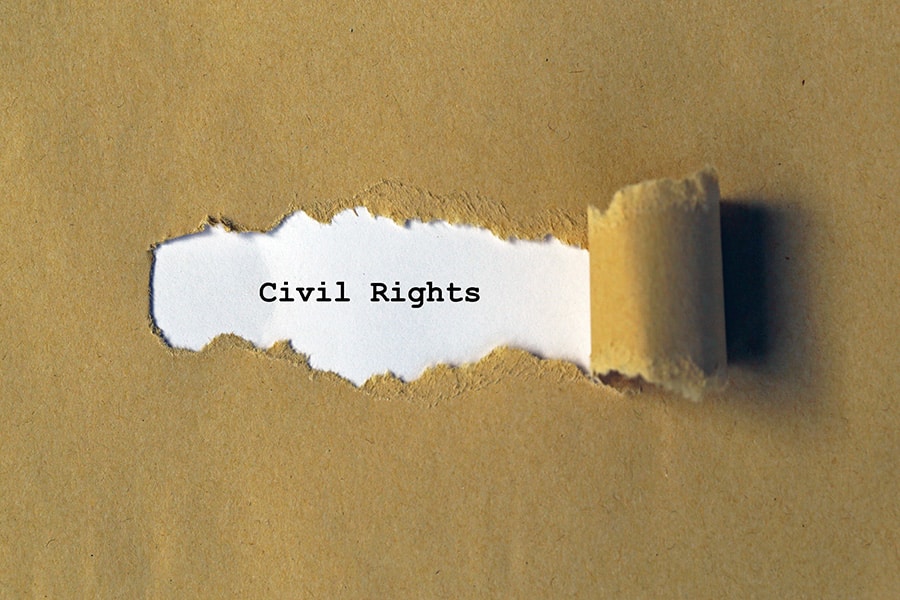There are many safeguards and protections within the United States to prevent unfair treatment and discrimination. To ensure that your Civil Rights are being upheld, you’ll need to know what your rights are.
Read on to learn about your civil rights, what are civil rights violations and what to do if your rights are being violated.
Understanding Your Rights
Civil rights are the protections against harassment and discrimination. The Constitution protects several fundamental rights for all people. This list of rights is further expanded on by state and federal legislative protections.
Religious Freedom
Religious freedoms are heavily guarded by the Constitution and by civil rights legislation. It is unlawful to prohibit someone from practicing a peaceful religion or discriminate on the basis of religion. Religious freedom is protected through many forums, including within public schools, housing, the work environment, businesses, prisons, and more.
Students’ Rights
Students maintain their Constitutional rights in and out of the classroom. The Supreme Court has continuously upheld the freedom of speech and other protections within schools.
Voting Rights
Voting rights are also heavily protected. You maintain the right to vote, free from harassment or intimidation at the polls. It is illegal to question voters about their citizenship, spread false information about voting requirements, and perform other acts designed to purposefully inhibit the ability to vote.
Protesters’ Rights
The First Amendment of the U.S. Constitution protects your right to petition, assemble, and protest. While there are restrictions for hate speech and private property, this right allows you the freedom to peacefully protest anything.
Disability Rights
Federal law protects individuals with disabilities from harassment and discrimination. Most of these pertain to disability discrimination in the workplace. You do not have to inform an employer of a disability when you apply for a job or when you are hired. You also have the right to receive reasonable accommodations.
Immigrants’ Rights
Immigrants also have rights and protections. Regardless of whether you have legal or illegal immigrant status, ICE and other government officials have restrictions on what they can and cannot do. If you do not consent, for example, immigration agents cannot search you or your belongings.
Prisoners’ Rights
If you have been convicted of a crime and incarcerated, you still have rights that need to be protected. The Eighth Amendment protects individuals from excessive force or brutality by other prisoners. You also have the right to exercise your religion when in prison.
LGBTQ Rights
As part of your civil rights, LGBTQ individuals have the right to be themselves and to express themselves. This is further protected in cases of LGBTQ students, as the educational institution has a duty to protect these rights and promote a safe environment.
What Qualifies as a Civil Rights Violation?
A civil rights violation is the discrimination, threat of force, or assault against an individual because of their membership with a protected class.
Common Examples of Civil Rights Violations
If you are unduly harassed, threatened, or otherwise assaulted on the basis of gender, age, national origin, race, color, or disability, your civil rights may have been violated.
Examples of Discrimination
Race Discrimination
Discrimination on the basis of race is an example of a civil rights violation. It is illegal to refuse service or unfairly differentiate against an individual because of their race or color. Examples of racial discrimination include racial profiling, racial housing discrimination, racial employment discrimination, and more.
Housing Discrimination
One of the common ways discrimination is levied is through housing. Refusing to rent or sell to an individual because of their status as a member of a protected class is housing discrimination.
Sex & Gender Discrimination
It is illegal to treat someone negatively or unfairly because of their sex, gender, or sexual orientation. Sex and gender discrimination is commonly seen in the workplace, but it can exist anywhere where undue treatment is being exerted because of gender.
Sexual Assault as Civil Rights Violations
Sexual assault is another example of a violation of civil rights. It is an assault against an individual on the basis of sex and gender. While assault is illegal in its own right, sexual assault is also considered to be a civil rights violation. This means that an institution that allowed the assault to occur may also become liable.
Illegal Search and Seizure
The Fourth Amendment protects anyone from illegal search and seizure. Law enforcement officers who violate this protection may be violating a subject’s civil rights and could therefore be liable for damages.
There are several instances in which police are allowed to complete searches and seizures for the protection of the public. Search warrants and probable cause are two such examples.
Workplace Sexual Harassment
Sexual harassment is a form of civil rights violation on the basis of sex. It can happen to either gender by co-workers, superiors, or by any workplace staff. Sexual harassment can include:
- Offensive remarks about a person’s sex
- Verbal or physical assault on the basis of sex
- Requests for sexual favors
- Unwelcome sexual advances
Final Thoughts
Do you think that your Civil Rights may have been violated? If you have been the victim of a Civil Rights violation, you may be entitled to compensation. Give us a call at 800-874-3528 to schedule your free consultation.
